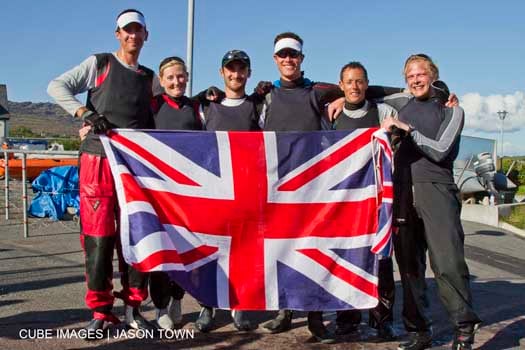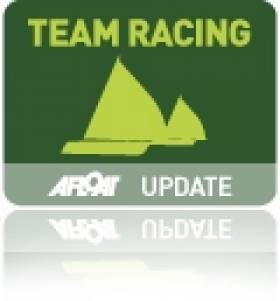Displaying items by tag: kirby
West Kirby Teams Top ISAF Worlds in Schull
Saturday's racing in the ISAF World Team Racing Championships in Schull Harbour began in light southwesterly winds which developed into a fresh northwesterly by late morning. First action was the semi-final stages of the World Youth Championship.
Here, the host club Schull Community College, representing Ireland, took on Sevenoaks (GBRY2) while the in form Spanish team from Barcelona took on the top ranked British team West Kirby Youth (GBRY1),each in a five race sail off for a place in the World Final. Schull opened with two winning combinations but Sevenoaks hit back ,winning the third with a 1,3,4 combination. However, Schull C.C. took the fourth race to clinch a place in the final.

In the second semi the Spanish opened with a flourish and had two wins under their belt before West Kirby Youth seemed to realise they were in a World semi-final and looking defeat in the face. Their backlash came hard and fast. They took the next two
races to level the match and in a dramatic fifth race decider, in which the Spanish team fought to the finish, they secured their final place.
There was huge local anticipation and excitement entering the final with the host club facing the possibility of a World Youth title. However ,they had a shaky start losing the first of the five races.This brought about a loss of composure and with a few penalty umpiring calls going against them, and deservedly so, they forfeited the second race also to a humbling 1,2,3, combination from the British team. A lesser team might have caved in at this stage, but they rallied and hit back, winning the third and fourth races.The final deciding race was contested with passion ,commitment and no little skill, with the home team looking like they would just steal the march with a winning combination approaching the finish, but a finish line infringement cost them the race and the title. West Kirby Youth( GBR3) are the World Youth Team Racing Champions 2011, a tribute to their skill, consistency and discipline throughout this World Championships.
The third place sail off between the Spanish team and Sevenoaks (GBRY2) resulted in a win for the Spanish who, together with the first and second placed youth teams,joined the five Open qualifiers who made the cut, in the Open quarter finals.
This was sailed as a round robin, with the four top ranked teams from the USA and Great Britain making it to the semi- finals, namely, NCYC Team Extreme (USA1), Woonsocket Rockets (USA2), West Kirby Hawks( GBR1) and Wessex Exempt (GBR2). The placings meant that both USA and British semi – finalists were pitted against each other in the penultimate round ensuring a Britain v USA final.
At this stage form and consistency came to the fore with Team Extreme and West Kirby Hawks securing their final berths with three straight wins over their fellow countrymen .
West Kirby Hawks attacked early on and took the first race of the final with a convincing 1,2,3 win. Team Extreme hit back taking the second 1,2,5. The third race proved crucial with Hawks' master tactician Andy Cornah, king of the Championship, working himself and Dom Johnson into 1,2 positions to snatch the win. This proved the race that smashed the American challenge as Team Extreme's Zach Brown was over at the start in the fourth and The Hawks stole in at 1,2,3 , a lead they didn't relinquish. At three races to one the Championship was over and West Kirby Hawks, Great Britain's top ranked team racers ,are worthy ISAF World Team Racing
Champions 2011 and have avenged their defeat by USA's Team Extreme in the British Open Team Racing Wilson Trophy Final back in May of this year. The bronze medallists are Woonsocket Rockets (USA2) who defeated Wessex Exempt(GBR2) with three straight wins in the sail off for third place.
RESULTS
OPEN WORLD CHAMPIONSHIP :
1. West Kirby Hawks ( GBR1)
Helms: Andy Cornah, Ben Field, Dom Johnson.
Crews: Hamish Walker , Tom Foster, Deborah Steele.
2. NYYC Team Extreme (USA1)
Helms: Zach Brown, Peter Levesque, Stuart Mcnay
Crews: Emmet Smith, Marla Menninger, Michael Hession.
3. Woonsocket Rockets (USA2)
Helms: Joel Hanneman, Brian Kamilar, Justin Law.
Crews: Alexa Schuler, Lyndsey Gibbons- Neff, Adrienne Patterson.
YOUTH WORLD CHAMPIONSHIP:
1. West Kirby Youth ( GBRY1)
Helms: Cameron Douglas, Ben Robinson,Sophie Shepherd.
Crews: Sarah Lombard, Charlie Fitzgerald, FreddyWilliams.
2. Schull Community College (IRLY3)
Helms: Conner Miller, Oisin O' Driscoll, Jay Stacey
Crews: Ellen O' Regan, Katie Moynihan, Kasper Snashall.
3. Spain (ESPY1)
Helms; Carlos Robles, Adriana Rodes, Jordi Xammer.
Crews: Florian Trittel, Lucia Brugman, Alex Claville.
























































